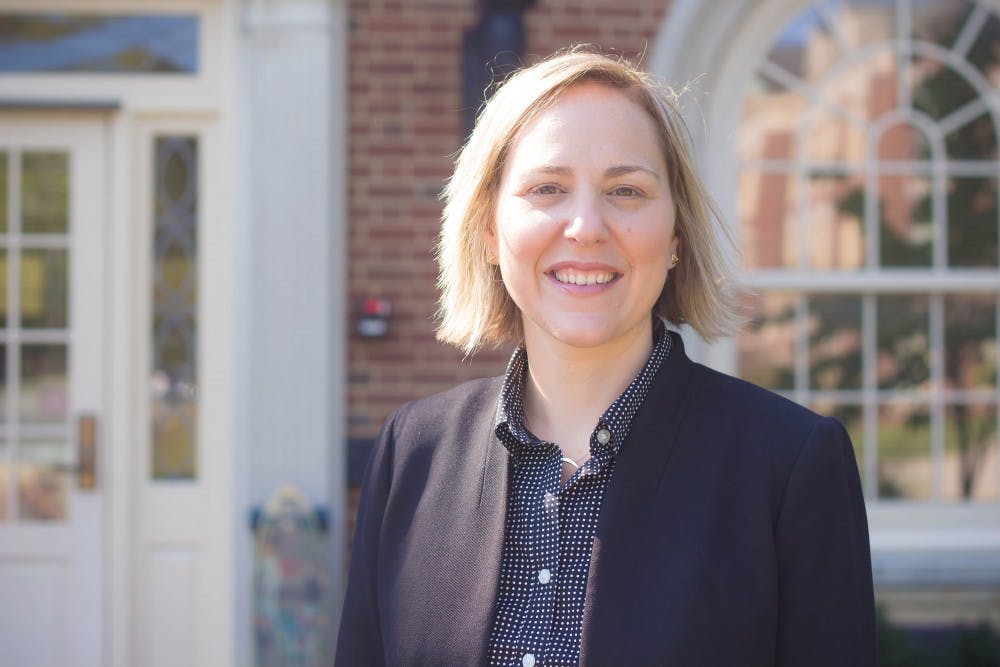Kimberly Moore, Miami University's new dean of students, worked for 14 years at Loyola University Chicago where she had a bookshelf in her office.
The bookshelf was filled to the brim with the obligatory assortment of books, picture frames and inspirational quotes. But what made it really unique was the knickknacks.
Loyola students had a goal to "make the bookshelf" as they were about to graduate, often bestowing Moore with small gifts and tokens of appreciation before they entered the real world.
A Dwight Schrute bobblehead, a Sister Jean figurine and a maroon-and-gold scarf stand out in particular on Moore's new bookshelf in Warfield Hall office.
Dwight's bobblehead used to be passed among Moore's Loyola colleagues at the end of meetings to say, "Hey, you're doing an awesome job." When she left Chicago for Oxford, her colleagues gave her Dwight to keep.
The Sister Jean figurine is an original from 2011, a gift from Loyola's marketing athletic director, seven years before Loyola's men's basketball team made a historic run to the Final Four.
The gold-and-maroon scarf, a symbol of the "Harry Potter school," or how Loyola is affectionately referred to in the media, was a tradition first brought to the university by Moore.
"When we were [first] launching spirit week we were trying to come with swag," Moore said. "And...we decided to print these varsity scarves and they took off."
Moore is the originator of quite a few traditions on Loyola's campus, from the Hogwarts-esque scarves to the school's Convocation Walk and Cheer Tunnel to the Commencement Walk.
She started her career by working in Chicago's West loop, climbing the ladder in advertising and marketing after graduating from St. Mary's College in Notre Dame, Indiana.
"It informs my lens, but I didn't enjoy the work," Moore said. "It didn't feel purposeful to me and I felt like something was missing in my work."
In fact, it was only after Moore was invited back to St. Mary's to give a lecture on business ethics when she realized what her true passion was: education.
Enjoy what you're reading?
Signup for our newsletter
"I thought to myself as I was standing [at the podium], 'how do I do this?" Moore said.
She wanted to make her work's purpose about student development.
Moore quit her job in the corporate world and switched gears, seeking a master's degree in higher education at Loyola, instead of the MBA program to which she was initially accepted.
After graduating in 2004, Moore was hired on full-time as the director of student affairs and Greek life and worked there for 14 years before making the shift, and five-hour drive, to Miami.
But, Moore is no stranger to the ever-growing list of problems facing Miami's culture, and is prepared to tackle them head-on.
"Miami stood out in the sense that there's a focus on the whole person," Moore said. "It's an academic and human experience. [But] Miami has a unique set of circumstances that make the work different here."
For Moore, changing the worst parts of Miami culture requires a systemic approach. Both Miami students and staff, she believes, need to recognize that there is no "one-off" solution to all of the challenge areas --sexual assault, diversity and inclusion, mental health and high-risk drinking.
"No one office or department owns any of these things or its solutions," she said.
Moore, who took over for former dean of students Mike Curme on July 23 this past summer, has two main goals: to listen and learn, and to build relationships.
"I've seen and heard students empower one another through peer to peer accountability," she said. "If students care for one another, things start to change. Racist remarks shouldn't be okay.
"Who's allowing them and who's staying silent?" Moore said.
Moore emphasized that one of her biggest goals is to cultivate a culture at Miami in which students are held accountable and hold each other accountable for what they say and do.
"When folks do not feel safe in our environment, we all have something to lose," she said.
The same holds for addressing sexual assault, which is often a major problem within the Miami community. There have been six cases reported in the first month of this semester alone.
"We can't seem to figure this one out, nationally or internationally, as human beings," Moore said. "There are best practices I could speak to: awareness, programs, training...the law.
"But we're not missing any of the procedures," she added.
Instead, Moore suggested that we have to do more to learn about who our students are. Surveys and data, she said, only tell one piece of the story, and assault is not okay in any way, shape or form.
"Our nation isn't even in agreement about this," Moore said. "We need to keep having conversations about why students behave in this way."
At the end of the day it's about doing the right thing, she said.
"How do we help students see the interdependence and connectivity with one another changes behavior?" Moore said.
She wants to help and is ready to dive in, setting up meetings with leaders on campus, faculty members and administrators and is already participating: Moore had a spot on last week's first-ever diversity inclusion forum.
She wants students to feel comfortable approaching her on how to address the problems facing Miami and how we can help each other care for one another.
Moore's door is open.
And, there are a few empty spots on her bookshelf, too.




